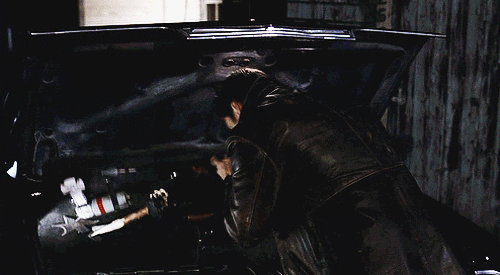Originally posted June 2, 2008.
Read this entire series, for free, via the convenient Left Behind Index. This post is also part of the ebook collection The Anti-Christ Handbook: Volume 1, available on Amazon for just $2.99. Subliminal advertisement. Volume 2 of The Anti-Christ Handbook, completing all the posts on the first Left Behind book, is also now available.
Left Behind, pp. 440-442
Buck felt more alone than ever on the flight home. He was in coach on a full plane, but he knew no one. He read several sections from the Bible Bruce had given him and had marked for him, prompting the woman next to him to ask questions. He answered in such a way that she could tell he was not in the mood for conversation.* He didn’t want to be rude, but neither did he want to mislead anyone with his limited knowledge.
Why the brush-off? His dodging of this woman’s questions would seem to be, from the authors’ own perspective, a shirking of responsibility. I realize that Buck is not yet a fully certified convert, but he has already decided that the stuff he’s reading there is the Most Important Thing. When someone asks you a direct question about the Most Important Thing, it seems cruel not to tell them what you know, even if your answers are only partial or limited (as opposed to having un-limited knowledge, which the authors seem to suggest is a possibility).
So here is this poor woman. She witnessed the Israel miracle and then The Event, and she’s started putting two and two together. Now she’s desperate for answers and she turns to Buck Williams. He’s got Bruce’s annotated Bible right there in his hands. He’s just finished what amounts to a three-day seminar, complete with Bruce’s “crash-course in prophecy” and one, maybe two viewings of the ICR video. He is, in other words, the perfect person to begin to answer her questions.
Yet he doesn’t.
The morning before he was “moved to tears” by Chloe’s story, in which she said that she believed his presence in the airplane seat next to hers was a sign from God. If he believes that to be true, then surely it was also God’s divine plan that he is again, just a few days later, in an airplane seat next to a woman full of questions about God. But if Buck’s presence in the next seat was a sign of God’s love for Chloe, his presence next to this woman would seem to be a sign that God, like Buck, doesn’t care what happens to her. (What if this woman gets off the airplane, walks out of the airport and gets hit by the Hypothetical Bus?)
I’m also not sure what to make of the apparent warning there against evangelism by those with only “limited knowledge.” Throughout the rest of the book, this is presented as a universal, unavoidable duty for every believer. But here they seem to be saying it’s better left to the experts. Odd.
The frustrating thing here is that this woman’s questions would likely have been very similar to the questions Buck is asking himself. She would have provided a convenient means to present Buck’s inner monologue as an actual dialogue, a conversation. But instead he blows her off and goes back to sulkily asking himself rhetorical questions in what seems like the voice-over narration of a bad movie. (I really believe that Jerry Jenkins has a Post-it note stuck to the monitor of his computer reading, “Tell, don’t show.”)
Sleep was no easier for him that night, though he refused to allow himself to pace. …
This is, like, totally different from the bit in the last chapter where Buck was up all night, unable to sleep as he grappled with these same questions. In that scene, Buck was pacing. Here, he’s not. See? Totally different.
He was going into a meeting in the morning that he had been warned to stay away from. Bruce Barnes had sounded convinced that if Nicolae Carpathia were the Antichrist, Buck ran the danger of being mentally overcome, brainwashed, hypnotized or worse.
There is that, of course. But keep in mind that Buck is also headed to a meeting where he will be sitting alongside Jonathan Stonagal and Todd-Cothran for the first time since he’d been forced to fake his own death and travel incognito because they planted a bomb in his car. This is the same Todd-Cothran, you’ll remember, who telephoned Scotland Yard to inform them that he’d be murdering one of their policemen and there was nothing they could do about it. Yet Buck doesn’t seem to be the slightest bit anxious about seeing these men face to face. He had promised — cross-my-heart, pinky-swear — never to write anything bad about them and in exchange they had agreed not to murder him in cold blood. Buck sees no reason not to take them at their word, so he’s not nervous to be meeting them face to face.
As he wearily showered and dressed in the morning, Buck concluded that he had come a long way from thinking that the religious angle was on the fringe. He had gone from bemused puzzlement at people thinking their loved ones had flown to heaven to believing that much of what was happening had been foretold in the Bible. He was no longer wondering or doubting, he told himself. There was no other explanation for the two witnesses in Jerusalem. Nor for the disappearances. …
So he now believes the “religious angle” should be central to his article on the disappearances. He believes, in fact, that there could be “no other explanation.” Yet he doesn’t end up writing any of that in his article. He treats his readers just like he treated that poor woman on the plane. He has the answers, but he’s not in a mood to share them.
But hold that thought, I’m getting ahead of myself.
We get another half-hearted attempt at the Stonagal-as-Antichrist red herring. This, again, seems useless at this point in the book, since everyone who’s been paying attention already knows without a doubt that Nicolae Carpathia is the Antichrist. What kind of obtuse fool could possibly think otherwise?
Buck still leaned toward Stonagal. …
OK, then. So our half-witted hero heads out the door:
He slung his bag over his shoulder, tempted to take the gun from his bedside table but knowing he would never get it through the metal detectors. Anyway, he sensed, that was not the kind of protection he needed. What he needed was safekeeping for his mind and for his spirit.
The “safekeeping” he refers to there is the divine protection that Bruce told him would come with his conversion. If I were him, though, I’d also be loading up like the Winchester brothers, taking salt, garlic, holy water and maybe even some chalk for pentagram-drawing, just in case.

But now we turn to something interesting. Or, rather, we turn to something that might have been interesting:
All the way to the United Nations he agonized. Do I pray? he asked himself. Do I “pray the prayer” as so many of those people said yesterday morning? Would I be doing it just to protect myself from the voodoo or the heebie-jeebies? He decided that becoming a believer could not be for the purpose of having a good luck charm. That would cheapen it. Surely God didn’t work that way. …
At first glance, this seems almost like a direct response to our criticism here of the mechanistic magic implied in the authors’ idea of what constitutes salvation. Throughout the book the authors repeatedly and consistently portray “praying the prayer” as a transaction, almost like an incantation that binds God to the spellcaster’s will like a djinni. Pray the prayer, get the salvation. This passage might be LaHaye & Jenkins’ way of saying that they don’t really mean that.** But then we read the rest of the paragraph:
… Surely God didn’t work that way. And if Bruce Barnes could be believed, there was no more protection for believers now, during this period, than there was for anyone else. Huge numbers of people were going to die in the next seven years, Christian or not. The question was, then where would they be?
So the authors are saying, explicitly, that we must not say the magic words as a temporal “good luck charm.” God doesn’t work that way. The magic words are meant to be an eternal good luck charm, protecting our souls from the voodoo and the heebie-jeebies of the afterlife.
The authors here are treading carefully to avoid the more interesting question here, one that is suggested more strongly in the following paragraph:
There was only one reason to make the transaction, he decided — if he truly believed he could be forgiven and become one of God’s people.
What really matters to L&J is whether or not Buck “truly believes” — whether or not he is, like Rayford, passionately sincere and sincerely passionate. My Calvinist brother calls this “Great Pumpkin” spirituality — the idea that our sincerity, rather than God’s grace, is the decisive factor. I’m very much not a Calvinist, but I agree that such Great Pumpkin spirituality makes no sense. Jesus’ parables are filled with characters begging for forgiveness for the most selfish and venal reasons imaginable, yet that never matters in those stories.***
But even though Buck uses the word “forgiven” here, it hardly seems like he really thinks forgiveness is something he needs. We don’t even get the half-baked sort of thing we got with Rayford, where he seemed to be repenting of his own awesomeness. Buck seems to think that God’s grace works like a personal line of credit — that it’s only offered to those who can demonstrate they don’t really need it. In Buck’s scenario, God is willing to save those who ask unless they really need saving, because “that would cheapen it.” Or something.
One can imagine a more interesting version of this story in which Buck, desperate to save his own sorry hide, was perfectly willing to beg for help in the cheapest, crassest way imaginable, and primarily for the most selfish of motives. What would come next? Would the receipt of such unmerited grace force him to change and grow? Or would he be able to maintain a selfish ingratitude (“Thanks for the eternal salvation … sucker!”)? That would of course be a very different story requiring very different authors than the ones who gave us this book.
God had become more than a force of nature or even a miracle worker to Buck, as God had been in the skies of Israel that night. It only made sense that if God made people, he would want to communicate with them, to connect with them.
Unless, of course, those people are seated next to Buck on an airplane, in which case they’re S.O.L.
Buck entered the U.N. through hordes of reporters already setting up for the press conference. Limousines disgorged VIPs and crowds waited behind police barriers.
Police barriers. A red-carpet entry for a press conference by the new secretary-general. That might have worked as a satiric device meant to describe Nicolae’s movie-star-like popularity, but I don’t think that is what was intended. The authors seem to imagine that this is what life is like all the time for politicians and diplomats.
Buck saw Stanton Bailey in a crowd near the door. “What are you doing here?” Buck said.
“Getting autographs,” Bailey says. “Omigod, did you see Richard Holbrooke? He’s so dreamy!”
OK, not quite that, what the authors actually have Bailey say is this:
“Just taking advantage of my position so I can be at the press conference. Proud you’re going to be in the preliminary meeting. Be sure to remember everything. Thanks for transmitting your first draft of the theory piece. I know you’ve got a lot to do yet, but it’s a terrific start. Gonna be a winner.”
This is impossible. Buck hasn’t written even a rough outline of this article yet, let alone a first draft. We readers know this. We’ve been with him through every step of every day since the article was assigned and he hasn’t written a thing. He hasn’t had time.
Based on Bailey’s reaction, the Rapture theory doesn’t seem to be a dominant theme in Buck’s first draft. This is also impossible. Apart from his coworkers, the only person Buck has interviewed so far for this article is Rayford Steele. He hasn’t talked to any scientists about the possibility of an “electromagnetonuclear” incident, or to any UFO theorists or anyone else about any other possible explanations for the disappearances. So how can he have written a first draft that gives those other theories greater weight than the only theory he has researched? And if he really believes in that theory, if he really believes “there was no other explanation,” then why doesn’t he make that case in his article?
Like Bruce and Rayford, Buck seems far more interested in being initiated into the secret prophecy knowledge of the Tribulation Force than he is in sharing that truth with anyone else, whether it’s the woman next to him on the plane, or Hattie, or the readers of Global Weekly, or even his boss and his coworkers. After all, if he shared this secret knowledge with everybody, then there’d be no one left for him to say “I told you so” to.
“Thanks,” Buck said, and Bailey gave him a thumbs-up. Buck realized that if that had happened a month before, he would have had to stifle a laugh at the corny old guy and would have told his colleagues what an idiot he worked for.
We might have mentioned this before, but Buck Williams really is a douchebag.
– – – – – – – – – – – –
* This scene’s inversion of the usual nightmare-seatmate dynamic also seems like the premise for a comedy sketch:
PASSENGER 1: Say what’s that you’re reading? Is that the Bible?
PASSENGER 2: What? Oh. Oh, yes. It’s the Bible. … I’m sorry, I’ve got a lot of reading to finish here and I just wanted to …
PASSENGER 1: Oh sure, sure. No problem. Sorry.
P2: …
P1: Sorry, I know you’re trying to read, but I couldn’t help but notice your lapel pin. That little fish, that’s like a Christian thing, right? Like a “born-again” thing?
P2: Yes. The fish is a Christian symbol. Yes. Now, I’m sorry, but do you mind? (gestures back at the book)
P1: Oh right, sure. Sorry.
P2: …
P1: So how’s that work, anyway? Getting “born again”?
P2: Look, really, I don’t mean to be rude, but I’d really just like to sit here quietly and read until we get to …
P1: Hey, that’s cool! I didn’t notice that before.
P2: Excuse me?
P1: Your T-shirt! It looks just like a Budweiser T-shirt, but I just realized it actually says, “Be Wiser” — oh, and instead of “King of Beers” it says “King of Kings!” Cool. I guess that means Jesus, right? And that I’d be wiser if I … Hey, wow! Are those gospel tracts in your bag? Can I have one of those?
P2: Oh for God’s sake! Why do I always end up next to you people?
** LaHaye and Jenkins seem dimly aware that critics of their books exist, and they seem to have a vague sense that it would be good to respond to those critics. But they never quite do. The closest they come is passages like this one, or the earlier scene where Chloe objected that this apocalypse seemed hard to reconcile with “a God of love and order.” No one responded to Chloe’s objection, she just seemed eventually to drop it for no apparent reason.
*** The difficulty in those parables for my Calvinist friends arises from what happens next. The selfish servant, motivated only by a desire to save his own behind from prison, throws himself on the mercy of the king, but the king forgives him anyway. A nice Calvinist parable if it stopped there. But the story doesn’t stop there. “Forgive us our debts as we forgive our debtors,” we Christians pray, and we read “with the measure you use, it will be measured to you.” And sometimes I wonder if the whole Calvinist/Arminian reframing of the question isn’t just a means of avoiding what that seems to entail.
















